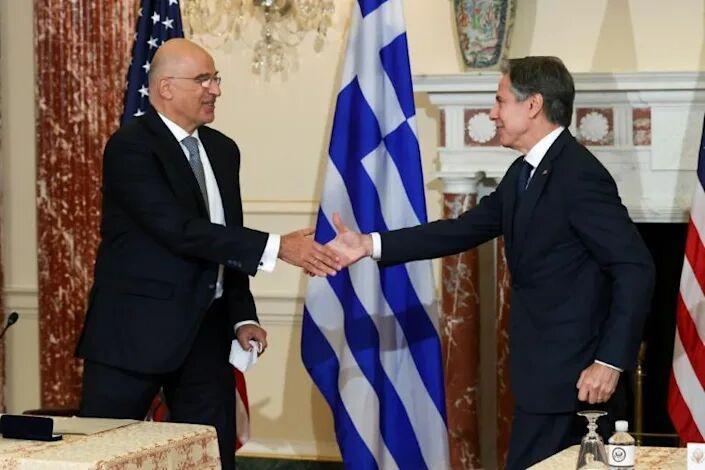During Blinken’s meeting with prime minister and foreign minister of Greece, the issue of improving the military infrastructures in Greece, as favored by the US, was raised. The parties agreed to improve the port infrastructure of the Souda military base and the 110th Larissa Air Base, which hosts MQ-9 drones, and those drones are responsible for monitoring the Eastern Mediterranean and the Black Sea.
Blinken and Wallander, the US Deputy Defense Secretary, emphasized the geostrategic value of the port of “Alexandroupolis” in Greece for the support and transfer of the US and NATO forces to Eastern Europe, and spoke of the possibility of strengthening the presence of the US forces in the area of Alexandroupolis, as well as the islands of “Crete, Larissa and Stefanovikio”. The American side emphasized the role of Alexandroupolis port as the main center for the transfer of defense weapons and military personnel to all of Europe and announced the readiness of the United States to invest in upgrading the facilities of this region. The US has invested more than 100 million euros in Greece to upgrade the facilities of Souda and Larissa bases.
From Greece’s point of view, bilateral relations between that country and the US are strategic and have reached their best point in the history of bilateral relations, and there is a clear prospect for further improvement.
The United States considers the defense cooperation between the two countries as the “backbone” of bilateral cooperation. Since the signing of the mutual defense cooperation agreement, the armies of the two countries have held several joint exercises, which are said to be very important for promoting peace and stability throughout the region. In order to support the NATO alliance, Greece and the US are temporarily stationed in Greece jointly, conduct military exercises or pass through Greek territory. The two sides emphasize the importance of continuing joint exercises to strengthen regional cooperation in Europe, the Eastern Mediterranean, North Africa and the Middle East.
These two countries also have joint exercises with the Zionist regime. The aim of the exercises is to develop and strengthen capabilities in dealing with “regional threats”. Such exercises have included various areas such as combat in residential areas, logistics during combat, night warfare, engineering capability, artillery and border protection with a focus on military innovation and international professional dialogue management.
The United States, which seeks to modernize Greece’s military weapons, has expressed its determination to continue cooperation in the field of selling defense weapons such as F-35 fighters and strengthen bilateral cooperation within the framework of NATO. According to the Greek defense minister, the answer to the Greek request will be received by the American side probably in April or May, and the said fighters will be delivered to Greece in 2028. The F-35 fighters will usher the Greek Air Force into a new era.
Defense and weapons cooperation between Greece and the United States is in a situation where Athens-Ankara relations have entered a new phase after the devastating earthquake in Turkey, but the evidence shows serious doubts about the improvement of those relations. Greek Defense Minister Panagiotopoulos clearly emphasizes that he is not sure that relations have entered a new phase. In order to be able to talk about entering a new phase, a series of stable and permanent things must be achieved. Certainly, due to the recent earthquake and the focus of the Turkish government on dealing with the problems caused by it, a change in the scene was seen. Greece has never closed the dialogue, but for the talks to be fruitful, they must be done under certain conditions. It is impossible to conduct dialogue under provocative rhetoric and actions that question the sovereignty of Greece.
In terms of Greece-Turkey relations, Blinken believes that ‘Greece and Turkey are our partners, allies and friends, and we will continue to work with them for the security of the region within the framework of NATO, so that issues can be resolved through diplomacy and threats that only increase tension will be avoided. This is more difficult in the pre-election period. If the differences between the two countries are resolved, greater opportunities will be created for the people of Greece and Turkey. It is important that our friends and partners manage their differences diplomatically. There is a common interest and goal in Athens and Ankara to resolve the differences between the two countries, and the two countries are willing to make this part of the world an area of cooperation rather than confrontation’.
It seems that the understanding of the earthquake aid will create a barrier against the slogans that both countries are involved in during the election process to get votes. This could be a prelude to the new dialogue process after the elections in Greece and Turkey. The softening of Ankara-Athens relations will also be a very useful factor for Turkey after the elections in terms of the development of relations with the European Union.
Not selling F-16 fighter jets to Turkey is still facing Turkey’s sensitivity. From Blinken’s point of view, members of the Congress have concerns and such concerns should be addressed. The sale of F-16 fighters to Turkey is not possible without the approval of the Congress.
Turkey is one of the partners of the US F-35 fighter program, but was removed from the F-35 program due to CAATSA sanctions, which, of course, considers this decision unilateral. Turkey expects the 1.4 billion dollars that it has paid (for the purchase of F-35 fighters) will be refunded.
The US Congressional Research Service has recently published a report on Turkey-US relations, which to some extent shows the US official view on Turkey. Although this report looks more positive compared to the last year, it implicitly admits that the American military bases in Greece are against Turkey and that the increase of American bases in Greece and Greek Cyprus is an action against Turkey.










0 Comments